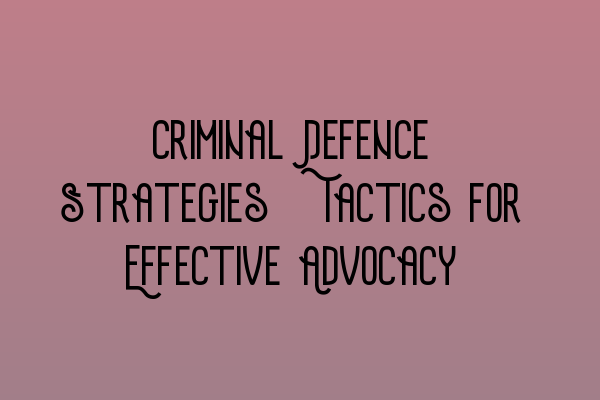Criminal Defence Strategies: Tactics for Effective Advocacy
When it comes to criminal defence, employing effective strategies and advocacy tactics is crucial to safeguarding the rights and interests of your clients. Criminal cases can be complex and challenging, requiring a comprehensive understanding of the law and a skillful approach to navigate the legal landscape. In this article, we will explore some key defence strategies that can make a significant impact on the outcome of a criminal case.
The Importance of Comprehensive Case Analysis
Before formulating any defence strategy, it is vital to conduct a thorough analysis of the case. This involves examining the evidence, witnesses, and any potential legal issues that may arise. A comprehensive case analysis allows criminal defence lawyers to identify the strengths and weaknesses of the prosecution’s case and tailor their strategy accordingly. It forms the foundation for building a strong defence that challenges the prosecution’s arguments and evidence.
Expert Witness Testimony
One effective defence strategy is to present expert witness testimony. Expert witnesses possess specialized knowledge and experience in specific fields relevant to the case, lending their expertise to support the defence’s position. By bringing in expert witnesses, such as forensic experts or psychologists, the defence can provide a different perspective on the evidence and help cast doubt on the prosecution’s case.
SQE 1 Practice Exam Questions can help you prepare for the theoretical aspect of becoming a criminal defence solicitor.
Challenging the Prosecution’s Evidence
An effective defence strategy involves meticulously scrutinizing the prosecution’s evidence. This includes examining the reliability, credibility, and admissibility of the evidence presented. Challenging the prosecution’s evidence can be done through cross-examination, presenting contradictory evidence, or highlighting any flaws in the collection or handling of the evidence. By undermining the prosecution’s case, the defence can weaken their argument and create reasonable doubt in the minds of the jurors or judge.
Utilizing Legal Defenses
Legal defenses provide an avenue for challenging the charges against the defendant. These defences can include self-defense, duress, necessity, or other applicable defenses depending on the specific circumstances of the case. Understanding the nuances of each legal defense and knowing when to employ them can greatly impact the outcome of the case. A strong legal defense can persuade the court to acquit the defendant or result in a reduced sentence.
If you’re looking for SQE 2 Preparation Courses to enhance your knowledge and practical skills in criminal law, be sure to check out our comprehensive course offerings.
Building a Compelling Narrative
Effective advocacy often involves crafting a compelling narrative that resonates with the judge or jury. By presenting a coherent and persuasive storyline, the defence can create a narrative that either contradicts the prosecution’s version of events or establishes a reasonable alternative explanation. Building a compelling narrative requires careful analysis of the evidence and an ability to present it in a compelling and memorable manner.
Seeking Pretrial Motions
Pretrial motions provide an opportunity to challenge the admissibility or legality of key evidence. These motions can seek to suppress evidence obtained through unlawful means, or to exclude evidence that may unduly prejudice the defendant’s case. By filing pretrial motions, the defence can assert its rights and potentially weaken the prosecution’s case before it even reaches trial.
If you’re in need of SQE 1 Preparation Courses to strengthen your foundation in criminal law, our courses are designed to provide comprehensive coverage of the syllabus and help you excel in the SQE exams.
Effective Cross-Examination
Cross-examination is a critical tool for challenging the credibility and reliability of witnesses. By carefully questioning the prosecution’s witnesses, the defence can expose inconsistencies, biases, or ulterior motives that may undermine their testimony. Skillful cross-examination techniques, such as leading questions or confronting witnesses with contradictory evidence, can significantly impact the jury’s perception of the witness’s credibility.
Stay up-to-date with the SRA SQE Exam Dates to ensure you are well-prepared for the qualifying exams.
Collaborating with Experts and Investigators
Collaborating with experts and investigators can strengthen the defence’s case. Experts can provide valuable insights and analysis in specialized areas, such as DNA profiling or accident reconstruction. Investigators can gather additional evidence or witness statements that may support the defence’s position. By assembling a competent team of professionals, the defence can present a well-rounded and robust case.
Persuasive Closing Arguments
A persuasive closing argument is the defence’s last opportunity to leave a lasting impression on the judge or jury. By summarizing the evidence, highlighting inconsistencies, and weaving together a compelling narrative, the defence can persuade the decision-makers to return a favorable verdict. A strong closing argument can solidify the defence’s position and counter any lingering doubts in the minds of the jurors.
In conclusion, employing effective criminal defence strategies and advocacy tactics is key to achieving the best possible outcomes for your clients. By conducting a comprehensive case analysis, leveraging expert witness testimony, challenging the prosecution’s evidence, utilizing legal defenses, building a compelling narrative, seeking pretrial motions, conducting effective cross-examinations, collaborating with experts and investigators, and delivering persuasive closing arguments, criminal defence solicitors can navigate the complexities of criminal cases with professionalism and skill. Remember, continuous learning and preparation through practice mocks and quizzes will further enhance your knowledge and expertise in criminal law.
